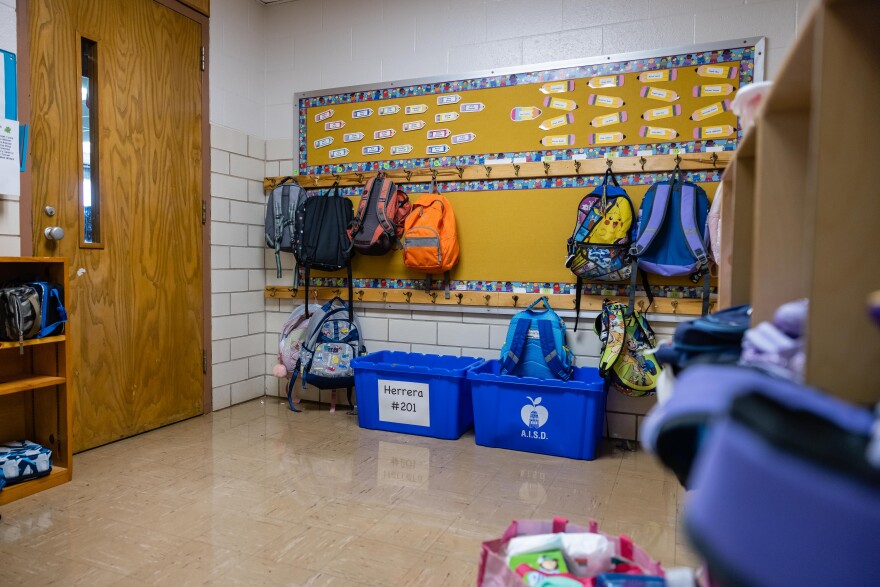In the wake of the mass shooting at Robb Elementary School in Uvalde that left 19 students and two teachers dead, Texas school districts are looking for ways to make their campuses safer. One strategy a growing number of districts are adopting is to require secondary students to carry clear or mesh backpacks during the upcoming school year.
Del Valle ISD, in southeast Travis County, already requires high school students to carry clear backpacks. Now the policy will also apply to middle school students. Manor ISD, another district in the Austin area, is rolling out the policy for the first time next school year; students in sixth-12th grade will be required to use them. Students will be able to carry small non-transparent bags, such as pencil cases and purses, but the maximum size is 6 by 9 inches. Elementary school students can continue to use traditional backpacks.
Dallas ISD, one of the largest districts in Texas, is instituting a transparent bag policy as well. It announced Monday that middle and high school students will be required to carry clear or mesh backpacks. Students can carry a pouch, no larger than 5.5 inches by 8.5 inches, for personal items such as cellphones and hygiene products.
The head of a statewide child welfare research and advocacy group told KUT schools are struggling to figure out how to respond to school shootings and show parents they are taking action.
“In many ways it’s like window dressing, right? Because I’m not sure that there’s any evidence to show that a clear backpack is going to stop a school shooting," Bob Sanborn, president and CEO of Children at Risk, said. "But it feels right.”
He also said it's a less expensive strategy.
“This is a way for schools to show parents we care what’s happening," he said. "We’re trying to keep your kids safe.”
Students at Marjory Stoneman Douglas High School in Parkland, Fla., were skeptical of the clear backpack policy school officials put into effect following the 2018 mass shooting that left 17 people dead. March for Our Lives, which was founded after that mass shooting, remains critical of these requirements.
Alexa Browning, an Austin-based policy associate for the organization, said these rules do not promote safety or address the root causes of gun violence.
"You can’t fit an AR-15 into a backpack anyways, so we need to address access to assault weapons more urgently than implementing school backpack policies."Alexa Browning, March for Our Lives
"We think that schools should be safe, joyful, and playful spaces and a clear backpack policy leans more toward a restrictive and policing policy,” she said. “We know that Black and Brown students are disproportionately affected by these policing policies in schools and so we think that a clear backpack policy will in turn, disproportionately impact Black and Brown students."
Browning added that restricting access to guns is a much more effective way to prevent school shootings.
“You can’t fit an AR-15 into a backpack anyways, so we need to address access to assault weapons more urgently than implementing school backpack policies," she said.
She also pushed back on the argument that clear backpacks would make it more difficult for students to bring handguns to school.
“There obviously is a real concern of gun violence among kids involving handguns, however, again, we don’t believe clear backpacks address the root causes of why kids turn to gun violence in the first place,” she said.
Groups representing Texas teachers say requiring clear backpacks is only one piece of the puzzle to improving school safety. Clay Robison, with the Texas State Teachers Association, said the group understands why school districts are adopting clear backpack policies.
“The school districts are doing the best they can to keep their students and teachers safe,” he said.
But, Robison said, the key to addressing gun violence is enacting gun reform laws.
“Let’s face it: The bottom line here is guns and the lack of true gun reform on the part of Gov. [Greg] Abbott and other state leaders,” he said.
Zeph Capo, president of the Texas American Federation of Teachers, takes a similar stance.
“It’s certainly better than doing nothing, and I think that if parents are aware of [it] and school districts think it will help with all around safety measures I don’t think it’s a bad idea,” he said.
But Capo pointed out clear backpacks need to be part of broader school safety strategies, especially since the policy will not apply to other people who may be coming onto campuses.
Sanborn said society shouldn’t be at a point where school districts even need to consider clear backpack policies, but “unfortunately that’s where we are today and it doesn’t seem like it’s going to change in the near future.”





